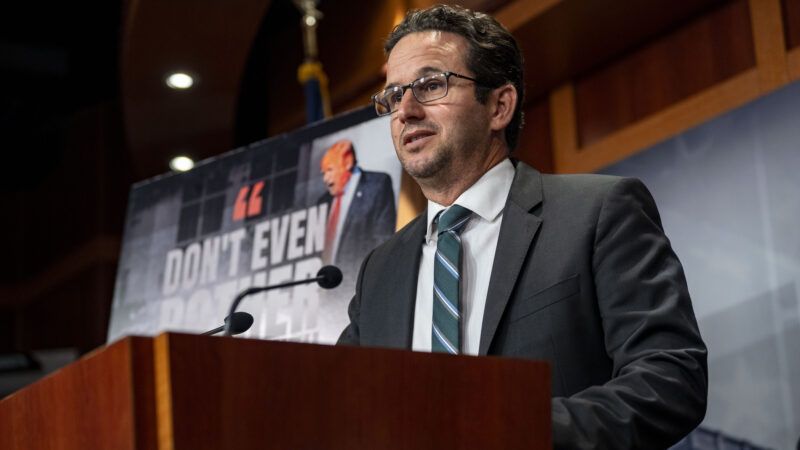Democrats' Bill Would Let Federal Workers Skip Paying Rent During Government Shutdowns
Suspending federal workers' civil obligations during government shutdowns would be bad news for property rights, landlords, and tenants.

Since the federal government isn't currently paying its bills during the shutdown, Senate Democrats think federal workers shouldn't have to either.
Sen. Brian Schatz (D–Hawaii) and 17 of his Democratic Senate colleagues have introduced a bill that would relieve federal workers and contractors from their obligations to pay rent, mortgages, insurance premiums, and student loan payments during shutdowns.
The bill would also stay eviction and foreclosure proceedings for 30 days after a shutdown ends. Anyone who tries to carry out an eviction or foreclosure of a federal worker or contractor during that time would be guilty of a misdemeanor and subject to fines or even jail time.
"Right now, hundreds of thousands of federal workers, federal contractor employees, and their families don't know whether they'll be able to pay rent and make ends meet. Our bill will protect these workers and make sure they aren't harmed during this shutdown," said Schatz.
To be sure, this bill is mostly signaling.
Politically, Republicans are not going to advance legislation that would reduce pressure on Democrats to vote to reopen the government.
Practically, the protections it would offer federal workers are unnecessary, at least in the housing context.
It would be odd, and indeed irrational, for a landlord to evict an otherwise good tenant if they miss a full rent payment during a government shutdown that will, in all likelihood, end in a few weeks. That's particularly true given that government workers are guaranteed back pay once a shutdown ends.
Pursuing an eviction in that context would require a landlord to kick out a tenant who's going to start paying their bills again soon, and instead incur the costs of the eviction itself, turning over the unit, and finding a new tenant.
Clearly, the reasonable thing to do would be for landlords and their current tenants to work out a deal in such circumstances. We have plenty of evidence that that's what happens even during even more severe economic shocks.
The COVID-19 pandemic and subsequent shutdowns put a lot of people out of work. Contrary to the predictions of activists, this did not produce a mass wave of evictions—either before or after eviction moratoriums were put in place, and even when promised federal rental assistance was hard to access.
By and large, tenants paid their bills with what funds they had, and landlords worked out deals about how to cover any shortfall.
As the pandemic receded, evictions did tick up over time. But that increase was largely the result of persistently delinquent tenants accumulating months, if not years, of rent debt and an improving economy making it more likely that a replacement tenant would be employed and pay on time.
The one way in which the shutdown might be different is that federal workers are a small segment of the overall market. Landlords might be more willing to evict a government worker when everyone else is still getting paid.
Nevertheless, the costs of doing so compared to the anticipated length of the shutdown still would seem not to make that a worthwhile thing to do.
And while the Democrats' bill is mostly signaling, it certainly doesn't signal anything good.
It shows that the eviction moratorium mentality learned during the pandemic is still alive and well. Any short-term disruption in the economy now justifies violating federalism and suspending the normal landlord-tenant relationship.
That's unfair to rental property owners. It's also not good for tenants broadly.
As it turns out, there are consequences to turning property rights off and on again.
A recent study published in the Journal of Urban Economics compared the strength of tenant protections to rents. They found that stronger tenant protections reduced evictions but also reduced vacancies and were correlated with higher rents and higher rates of homelessness.
The reason is pretty straightforward. Longer eviction processes add time and expense to removing delinquent tenants. Landlords compensate by pricing that increased risk into their asking rents and being choosier about who they decide to rent to.
Eviction moratoriums also create risks for taxpayers. Federal courts have ruled that eviction moratoriums are a taking for which the government owes affected property owners compensation.
Pending in the Federal Claims Court is the case of Darby Development Company, Inc. v. United States, in which landlords affected by the federal COVID-19 eviction moratorium are seeking $20 billion in compensation.
Should the Democrats' shutdown eviction moratorium pass, taxpayers could end up having to pick up the tab for any lost rental income that results from that bill. That'll be one extra line item to add to any spending bill that would reopen the government.
Rent Free is a weekly newsletter from Christian Britschgi on urbanism and the fight for less regulation, more housing, more property rights, and more freedom in America's cities.


Show Comments (91)